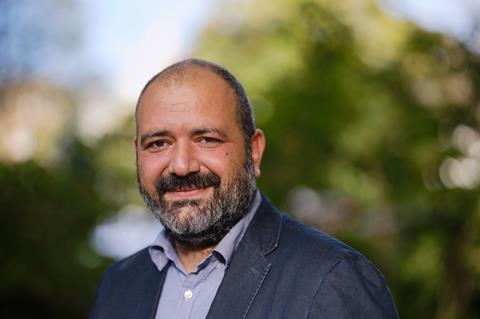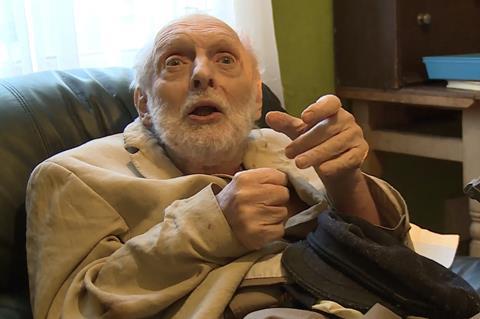
International Documentary Festival Amsterdam (IDFA) closed this weekend (November 20) having presented Danish filmmaker Lea Glob the best film award for Apolonia, Apolonia in the very ornate settings of ITA (International Theatre Amsterdam), one of the festival’s new bases, a few days earlier on Thursday November 17.
Festival director Orwa Nyrabia is pleased audiences are climbing back to 2019 levels and that the festival is successfully serving so many different constituencies. “If you look now from the US at IDFA, you will think this is a good stop on the awards trip,” he suggests.
Several awards contenders including Sara Dosa’s Fire Of Love, Ondi Timoner’s Last Flight Home and Tia Lessin and Emma Pildes’ The Janes have been screening in IDFA, either in the main programme or the market screenings sidebar Nyrabia introduced last year.
Bianca Stigter’s Three Minutes - A Lengthening premiered at IDFA last year, while Laura Poitras is the festival’s guest of honour with her Venice winner All The Beauty And The Bloodshed.
An IDFA award helps a film travel. UK director Simon Chambers’ previously unheralded crowd-pleaser Much Ado About Dying, which won the best directing award, is now eliciting interest from distributors. Nyrabia describes the documentary, about the relationship between the director and his frail, elderly and very exhibitionist uncle, as being “like a breath of fresh air”

Nyrabia also points to UK director Darren Emerson’s VR project In Pursuit Of Repetitive Beats, winner of the DocLab Competition for immersive non-fiction, as a highlight.
He acknowledges documentaries have been struggling at the box office since the pandemic and says traditional models of documentary distribution, where the distributor buys a film and “throws it on the screen,” may need to be transformed “into a much more curated approach.”
The way forward, he believes, may be more event-style releasing with guest speakers and debates alongside screenings, citing US distributor Neon’s curated roadshow release last year of Apichatpong Weerasethakul’s Memoria.
The festival’s overall budget has risen slightly since 2019. “IDFA over 35 years has proven its worth to this country,” he says. “The state is responding by appreciating that and backing us up.”
He describes the closure of the Edinburgh International Film Festival (whose parent company The Centre for the Moving Image went into administration earlier this autumn) as “a disaster”.
“To me, it is first and foremost immediately a failure of government,” he says. “When an organisation gets to such a place, an organisation which is a real part of the cultural life of a city and of a nation, it is the state’s responsibility to chip in.”
“When major corporations are in peril, the state steps in.”
IDFA raises much of its own funding through ticket sales and sponsorship.
Changing the gatekeepers
One commitment Nyrabia has made this year is to end what he calls ‘the unfair, abusive system of gatekeeping.” He apologises openly for the way filmmakers have been “taken for granted” not just by IDFA but other festivals too. “When I have maybe 200 slots for films and receive over 4,000 submissions, then it is a brutal selection process,” he acknowledges.
The aim is now to make sure that all filmmakers, especially those who don’t make the cut, realise the programming is “not a value judgment but a curatorial choice.”
Nyrabia is trying to democratise IDFA’s decision-making power. “I am much more interested in more than 50% of my selection team being women than in having more than 50% of my selection being made by women filmmakers every year. I what to fight the glass ceiling, the prejudice and the automation in the old ways we work. That will not happen if I keep the power in my own hands. I have to let go and share this power with others.”
He articulated his vision of a less hierarchical festival during last weekend’s “dialogue” on “what gender are film festivals” with author and philosopher Simon(e) van Saarloos. Midway through the talk, in the spirit of democracy, both van Saarloos and Nyrabia got off their chairs and continued their discussion sitting cross-legged on the floor.
“It’s not about me. That is the key message here,” he says.
Industry strength
IDFA used to be an 11-day festival with five days in the middle that were the key dates for industry attendees. Nyrabia has been on a mission to extend that to seven days. This year, he has made sure that the premieres and ‘important activities” are spread from “Friday to Thursday.”
He confirms he will be doing three more editions of IDFA. One key goal is to see IDFA safely housed in its new year-round home in Amsterdam’s Vondelpark. The public facing part of the building is due to open next summer. “That’s a big, very ambitious project of having a real home for documentary film and art in the very heart of Amsterdam with our very own cinema.”
The festival will continue in November as always but the new venue should enable IDFA operate all year round and to be yet more successful in reaching the “youth of the city.”
“The average of our viewer is going down over the last five years. Around 35% are under 35,” he says. “And the average age of our selectors and programmers is now substantially lower than it used to be. The people who choose the films are also young. I am among the oldest.”






![The Brightest SunScreen[Courtesy HKIFF]](https://d1nslcd7m2225b.cloudfront.net/Pictures/274x183/3/5/0/1448350_thebrightestsunscreencourtesyhkiff_312678.jpg)


















No comments yet